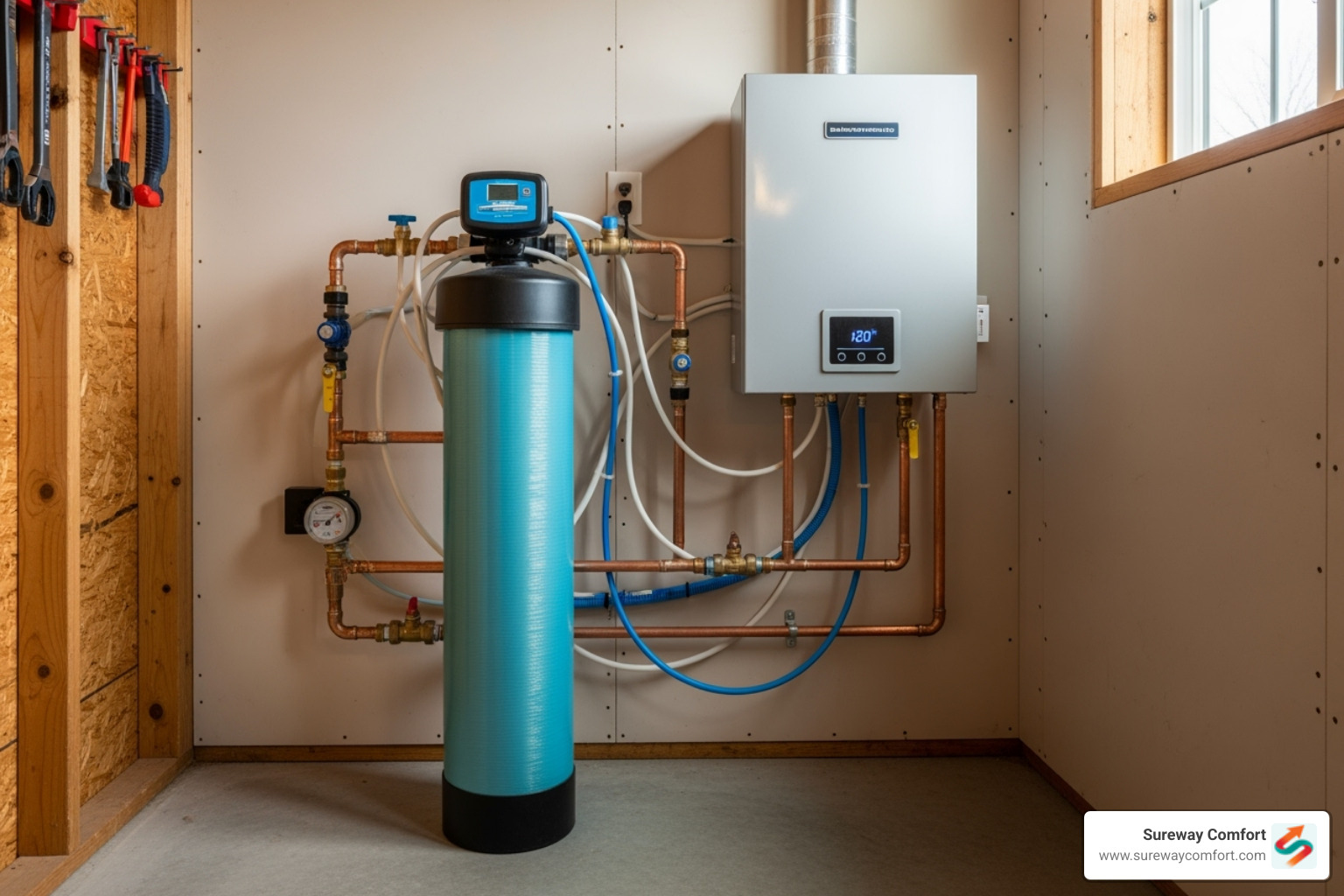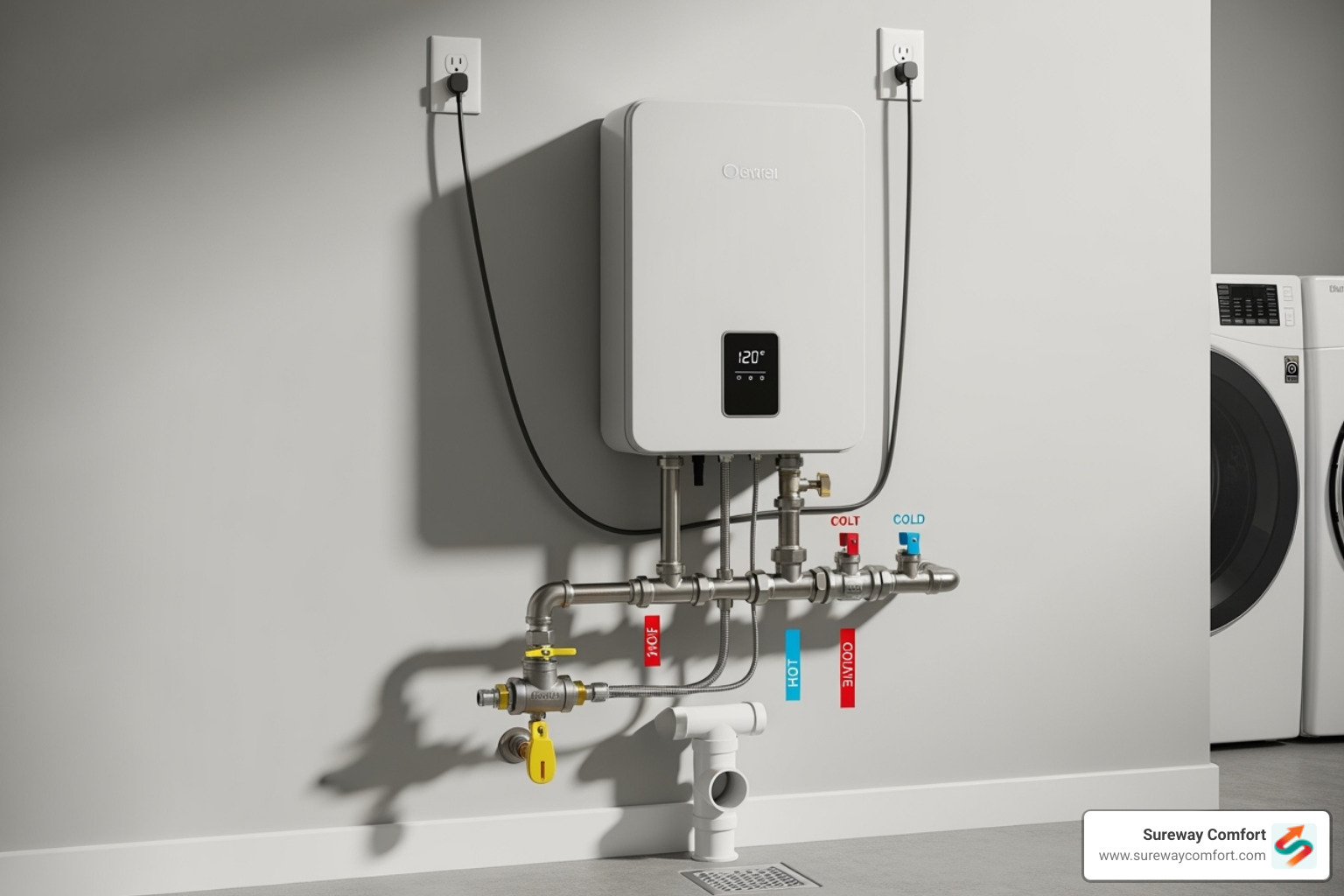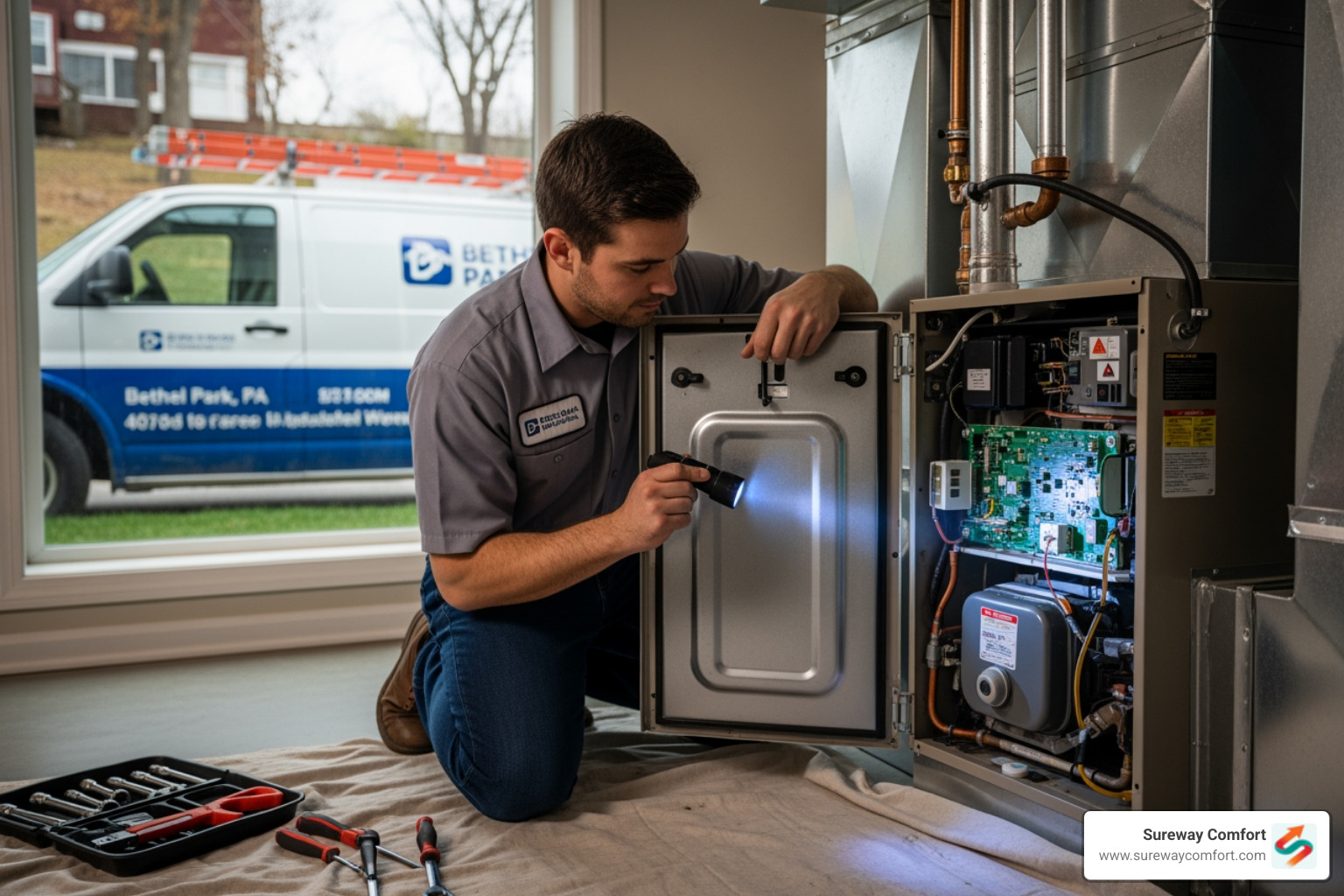Why Tankless Hot Water Installation is Revolutionizing Bethel Park Homes
Tankless hot water installation offers homeowners endless hot water, energy savings, and valuable space in their homes. Unlike traditional tank water heaters that store and continuously heat 40-80 gallons of water, tankless systems heat water on-demand as it flows through the unit.
Key Benefits of Tankless Water Heater Installation:
- On-demand hot water - Never run out during back-to-back showers
- Energy efficiency - 27-50% fuel cost savings compared to tank heaters
- Space-saving design - Wall-mounted units free up floor space
- Longer lifespan - Typically last longer than traditional tank models
- Increased home value - Modern, efficient systems appeal to buyers
The installation process involves careful planning for gas line capacity, electrical requirements, and proper venting. Most tankless units require a larger gas line (often upgrading from 1/2-inch to 1-inch) and direct-vent exhaust systems that pipe directly outside.
While DIY installation might seem appealing, the complexity of gas line work, electrical connections, and venting requirements make professional installation the safer choice. Improper installation can lead to gas leaks, carbon monoxide dangers, or voided warranties.
For Bethel Park homeowners considering the switch, understanding your home's specific requirements - from water pressure to BTU input needs - ensures you select the right system for your family's hot water demands.

Simple tankless hot water installation word guide:
Is a Tankless Water Heater Right for Your Bethel Park Home?
Choosing a tankless water heater for your Bethel Park home isn't just about wanting endless hot showers (though that's definitely a perk!). It's about understanding whether this technology matches your family's daily routines and your home's infrastructure.
The magic of tankless systems lies in their on-demand operation. While traditional tank heaters work like a slow cooker - keeping water hot 24/7 whether you need it or not - tankless units are more like a microwave, springing into action only when you turn on a hot water tap. A sensor detects water flow and fires up a powerful heating element that warms water as it passes through. This fundamental difference is why many homeowners see 27-50% fuel cost savings compared to conventional tank models.
Sizing Your Unit for Optimal Performance
Getting the right size tankless unit is like finding the perfect pair of shoes - it needs to fit your household's specific needs perfectly. This involves understanding three key measurements that work together.
Flow rate (GPM) tells you how many gallons per minute your unit can deliver. Picture your busiest morning: someone's showering while the dishwasher runs and another person brushes their teeth. If your family regularly uses multiple hot water fixtures simultaneously, you'll need a higher GPM rating. A cozy home with one bathroom might need around 4-6 GPM, while a busy household with multiple bathrooms could require 8-10 GPM or more.
BTU input determines how quickly your unit can heat that flowing water. Here in Bethel Park, our chilly winters mean incoming water temperatures can be quite cold, requiring more energy to reach your desired temperature. While a traditional tank water heater might use 30,000-40,000 BTUs per hour, a tankless unit often needs 90,000-130,000 BTUs to deliver instant hot water when you need it.
The Uniform Energy Factor (UEF) measures how efficiently your unit converts energy into hot water. Think of it as your unit's report card - higher UEF ratings mean more of your energy dollars go toward heating water rather than being wasted. This directly impacts your monthly utility bills.
You'll also encounter condensing vs. non-condensing technology, especially with gas units. Non-condensing models vent hot exhaust gases directly outside - they work great but lose some heat in the process. Condensing units are the overachievers of the tankless world, using a second heat exchanger to capture additional heat from those exhaust gases. They're more efficient but produce condensate that needs proper drainage. The extra efficiency often makes up for the slightly higher upfront investment.
If you're curious about selecting the perfect system, our guide on Choosing the Right Water Heater dives deeper into these considerations. And if your current system is acting up, check out Signs You Need Tankless Water Heater Repair to catch problems early.
Key Considerations for Your Tankless Hot Water Installation
Every Bethel Park home has its own personality, and tankless hot water installation needs to work with your home's unique characteristics. We've learned that proper planning prevents headaches down the road.
Gas line capacity is often the biggest surprise for homeowners. Tankless units need a substantial burst of gas when they fire up - sometimes more than your home's furnace! This usually means upgrading from a ½-inch gas line to a 1-inch line or larger. It's like upgrading from a garden hose to a fire hose to handle the increased demand.
Even gas tankless units have electrical needs. They require a 120-volt circuit to power their smart controls, sensors, and blowers. Electric tankless units are much more demanding, often needing dedicated high-amperage circuits that can handle their substantial power requirements.
Venting options for tankless units are straightforward but specific. These systems use direct-venting, meaning they pipe exhaust directly outside through a wall or roof. Unlike traditional water heaters that might share a chimney, tankless units need their own dedicated vent path. Condensing models also produce acidic condensate that requires proper drainage.
Local permits aren't optional - they're essential for safety and code compliance. Professional installation ensures everything meets National Fuel and Gas Code standards and local regulations. We handle the permitting process so you don't have to steer the paperwork maze.
Your home's water hardness can impact your tankless unit's performance and lifespan. Hard water leaves mineral deposits inside the heat exchanger, reducing efficiency over time. If your home has hard water, we might recommend a water softener to protect your investment.
Understanding your warranty coverage is crucial since improper installation can void manufacturer protection. Professional installation keeps your warranty intact and gives you peace of mind. You can explore warranty details through our Water Heater Warranty Lookup resource.
Placement considerations matter even though tankless units are compact. We consider proximity to high-demand fixtures, maintenance access, and optimal venting routes. Our article on Ideal Tankless Water Heater Placement covers the details.
FeatureGas Tankless Water HeaterElectric Tankless Water HeaterEnergy SourceNatural Gas or PropaneElectricityBTU InputHigh (90k-130k BTU/H typical)Measured in kilowatts (kW)Flow Rate (GPM)Higher (better for multiple fixtures/large homes)Lower (better for single fixtures/smaller needs)EfficiencyGenerally more efficient overall due to lower gas costsEfficiency depends on electricity cost; no standby lossVentingRequired (direct-vent only, often to outside)Not requiredElectrical Needs120 VAC for controls (gas valve, sensors, blower)Dedicated high-amperage circuits (e.g., 240V, 30A or more)Gas Line UpgradeOften required (e.g., 1/2-inch to 1-inch)Not applicableInstallationMore complex (gas, venting, electrical)Simpler (primarily electrical and water connections)NoiseCan be noisier than tank units when operatingQuieter than gas unitsCondensateYes, for condensing models (requires drain)No
The Essential Steps for a Professional Tankless Hot Water Installation
When we begin a tankless hot water installation in your Bethel Park home, we follow a careful, step-by-step process that puts safety first while ensuring your new system works perfectly from day one. Think of it as a well-choreographed dance – every move matters, and timing is everything.

Before we even touch a wrench, safety precautions are our top priority. We start by shutting off your utility connections – the main water supply, gas supply at the meter for gas units, and electrical power at your panel. This might seem obvious, but you'd be surprised how many DIY disasters start with someone skipping this crucial step. We always double-check these shut-offs because there's no such thing as being too careful when working with gas, water, and electricity.
Old unit removal comes next, and it's more involved than you might think. If you're upgrading from a traditional tank water heater, we carefully drain all the water first – that's typically 40 to 80 gallons that needs to go somewhere safe. We disconnect the water lines, gas or electrical connections, then remove the old unit completely. Don't worry about disposal – we handle that according to local environmental regulations, so you don't have to figure out what to do with a giant metal tank.
Mounting the new unit is where the space-saving magic happens. These compact units go right on your wall, freeing up valuable floor space. We select the perfect spot – usually close to your main hot water demands to minimize wait time – then securely mount it using a sturdy mounting system. Most installations require a mounting box made from solid lumber and plywood to ensure proper clearances and stability.
The water connections phase requires precision and quality materials. We connect new hot and cold water lines using durable copper piping, making sure every connection is absolutely leak-free. We'll install fresh shut-off valves on both lines, which makes future maintenance much easier. If your plumbing system needs it, we'll also add an expansion tank and pressure relief valve – these aren't just nice-to-haves, they're essential safety devices.
For gas models, gas line connections demand expert attention. We install the gas line with a sediment trap to catch debris and a shut-off valve near the unit. Every connection gets thread sealant specifically designed for gas lines. Then comes the critical part – we perform thorough gas leak testing using both pressure gauges and soapy water solutions. No shortcuts here – we won't turn on your gas supply until we're absolutely certain everything is sealed tight.
Even gas tankless units need electrical connections for their control systems, sensors, and blowers – they're basically computers that heat water. Electric units require much more substantial electrical work, often needing dedicated high-amperage circuits. We ensure all wiring meets National Electrical Code standards and includes proper grounding for your safety.
Venting installation is where tankless units show their unique requirements. Unlike traditional water heaters that might share a chimney, these units need direct-vent systems piped straight outside. We install the vent pipe through your wall or roof, making sure it's properly sized and sealed. If you're getting a condensing unit, we'll also install the condensate drain line to carry away the acidic water the heating process creates.
Finally, we handle the initial startup and testing with the same care we've shown throughout the process. We purge air from the water lines, gradually restore your water supply, then power up the unit following the manufacturer's exact procedures. We test everything – hot water temperature consistency, flow rates, and leak detection – then insulate the hot water pipe to maximize efficiency.
DIY vs. Professional Tankless Hot Water Installation: What to Know
We get it – there's something appealing about tackling home projects yourself. Maybe you're handy with tools, or perhaps you're looking to save some money. But when it comes to tankless hot water installation, we need to have an honest conversation about the risks involved.
DIY risks aren't just about getting frustrated with complicated instructions. We're talking about serious safety hazards that could put your family and home in danger. Carbon monoxide poisoning from improper venting is a real threat – this colorless, odorless gas can be fatal, and incorrect installation of gas units can create deadly situations. Water damage from poorly connected pipes can destroy floors, walls, and belongings while creating perfect conditions for mold growth.
Gas leaks represent perhaps the most serious risk. Tankless units require much more gas flow than traditional water heaters, and improper connections can lead to leaks that cause explosions or health problems. The electrical work isn't simple either – both gas and electric units need precise wiring that, if done wrong, can cause fires or electrocution.
Here's something many homeowners don't realize: voiding warranty coverage often happens with DIY installations. Manufacturers typically require professional installation to honor their warranties. Your homeowner's insurance might also deny claims related to DIY work that doesn't meet code standards. Imagine dealing with a major problem only to find you're not covered.
When to hire a professional isn't really a question for tankless units – it's always the smart choice. The complexity of gas line upgrades, electrical requirements, venting systems, and local permit requirements makes professional installation essential. We have the training, tools, and experience to handle every aspect safely and efficiently.
At Sureway Comfort, we've seen too many DIY attempts that turned into expensive emergencies. Our professional tankless hot water installation service ensures your system works perfectly from day one, stays covered under warranty, and keeps your family safe. Ready to enjoy endless hot water with complete peace of mind? Contact us today to schedule your professional tankless water heater installation!
Keeping Your System in Peak Condition: Maintenance and Care
Your shiny new tankless water heater is like that reliable friend who's always there when you need them – but even the best friends need a little care to keep the relationship strong! Think of maintenance as your way of saying "thanks" to the system that delivers endless hot showers and never leaves you high and dry (or should we say, cold and soapy?).
The truth is, tankless hot water installation is just the beginning of your journey. These high-performance units are incredibly reliable, but they do their best work when they're properly maintained. A little attention now saves you from bigger headaches down the road.

Annual Maintenance: Descaling and Flushing
Here in Bethel Park, we deal with hard water in many areas, and that means minerals like calcium and magnesium are constantly trying to make themselves at home in your tankless unit. Annual descaling is your best defense against these unwelcome guests.
Picture this: those minerals are like tiny party crashers that stick around long after the fun is over. They build up inside your heat exchanger coils, creating a crusty layer that acts like a thick winter coat on your heating elements. This scale buildup makes your unit work harder to heat water, reduces efficiency, and can eventually cause serious damage.
Descaling involves circulating a mild acidic solution – often just white vinegar – through your system for about 45 minutes to an hour. This gentle treatment dissolves the mineral buildup and gets your unit back to peak performance. It's like giving your water heater a refreshing spa day!
The flushing process requires isolating your unit and using specialized pumps to circulate the cleaning solution. While some handy homeowners might be tempted to tackle this themselves, we recommend professional service to ensure it's done safely and thoroughly.
Mineral buildup is one of the leading causes of premature failure in tankless systems. Regular annual flushing prevents this, keeping your unit running efficiently and extending its lifespan significantly. Trust us – this small investment in maintenance pays big dividends in performance and longevity.
The impact of water hardness on your tankless system can't be overstated. Hard water affects tankless units more severely than traditional tank heaters because those minerals directly interfere with heat transfer in the compact coils. If you have particularly hard water, you might notice reduced flow rates or temperature fluctuations – both signs that scale is building up.
One of the smartest investments you can make is installing a water softener system. This removes hardness minerals before they ever reach your tankless heater, dramatically reducing scale buildup. It's like having a bouncer at the door, keeping troublemakers out of your system. Plus, softer water benefits your entire plumbing system, appliances, and even makes your skin and hair feel better. For more insights on improving your water throughout your home, check out our guide on Boosting Home's Water Quality.
Beyond the annual descaling, your tankless system needs a few other maintenance touches to stay in top form. Filter cleaning is important – many units have inline filters that catch sediment before it enters the system. These need regular checking and cleaning to maintain proper water flow.
For gas units, ventilation system inspection is crucial for safety. We check that venting is clear of obstructions and properly sealed to prevent any carbon monoxide issues. The pressure relief valve also needs annual testing to ensure this critical safety component works correctly.
During professional maintenance visits, we perform a comprehensive inspection of all connections, electrical components, and gas lines. We're looking for any signs of wear, potential leaks, or developing issues that could cause problems later.
If you start hearing unusual sounds from your tankless unit – gurgling, popping, or banging – don't ignore them. These noises often signal mineral buildup or other issues that need attention. Our detailed article on Tankless Water Heaters: Noises & Solutions can help you understand what your unit is trying to tell you.
Regular maintenance isn't just about preventing problems – it's about protecting your investment and ensuring you continue enjoying the benefits of your tankless hot water installation for many years to come. We offer comprehensive maintenance plans that take the guesswork out of caring for your system, so you can focus on enjoying those endless hot showers without worry.
Frequently Asked Questions about Tankless Water Heaters
We know that choosing the right water heating solution for your home comes with plenty of questions. After countless tankless hot water installation projects throughout Bethel Park, we've heard just about every concern homeowners have. Let's tackle the big ones that keep coming up in our conversations with families just like yours.
How long do tankless water heaters last compared to traditional tanks?
Here's where tankless units really get to show off! Your traditional tank water heater is doing well if it makes it to the 8-12 year mark before calling it quits. Tankless water heaters, on the other hand, are built for the long haul - we're talking 20 years or more with proper care and maintenance.
Why such a dramatic difference? It all comes down to design. Traditional tanks are constantly battling corrosion and sediment buildup from storing all that water day in and day out. Your tankless unit doesn't have this problem since it only heats water when you need it. No storage means no standing water slowly eating away at the tank walls.
The upfront investment for tankless hot water installation might seem higher, but when you spread that cost over two decades instead of one, the math starts looking pretty attractive. Plus, you're getting all those energy savings year after year.
Will a tankless water heater provide instant hot water at the tap?
This is probably the biggest myth we encounter! While tankless heaters provide on-demand hot water - meaning they fire up only when you turn on a tap - they don't magically teleport hot water to your faucet.
Think about it this way: even after your tankless unit heats the water in a matter of seconds, that hot water still has to travel through your home's pipes to reach you. If your unit is tucked away in the basement and you're upstairs brushing your teeth, you'll still wait a few moments while the cool water in the pipes gets flushed out.
The wait time is usually shorter than with a traditional tank (especially if that tank is running low), but it's not instant. For true instant hot water at specific locations, you might consider a small point-of-use heater or a recirculation pump as part of your overall system design.
Can a tankless water heater handle a large family's needs?
Absolutely, and this is where tankless systems really shine! Large families are actually perfect candidates for tankless hot water installation. Remember those mornings when the third person to shower got stuck with cold water? Those days are over.
A properly sized tankless unit delivers continuous hot water for as long as you need it. We're talking back-to-back showers, running the dishwasher while someone's in the tub, and still having hot water left for the washing machine. The key word here is properly sized - that's where our expertise comes in.
We calculate your home's peak demand by looking at how many hot water fixtures might run simultaneously. For very large households with exceptional demands, we might recommend a high-capacity single unit or even multiple units working together. The goal is ensuring everyone gets their hot shower, even if they're the last one in the morning rush.
The beauty of tankless technology is that it scales with your needs. Whether you're a family of four or eight, we can design a system that keeps up with your lifestyle without missing a beat.
Ready to find if a tankless water heater is right for your Bethel Park home? Contact us today to discuss your family's hot water needs and explore your options with our experienced team.
Conclusion: Enjoy Endless Hot Water in Your Bethel Park Home
We hope this comprehensive guide has helped you understand everything about tankless hot water installation and how it can transform your daily routine. From those rushed morning showers to the relief of knowing you'll never run out of hot water during a busy evening with back-to-back baths, dishwashing, and laundry, a tankless system truly changes how you experience comfort in your home.
The reliability of endless hot water means no more strategic shower scheduling or disappointed family members stuck with cold water. The energy savings of 27-50% compared to traditional tank heaters can make a real difference in your monthly utility bills. And let's not forget the valuable floor space you'll reclaim when that bulky old tank is finally gone - space you can use for storage, a workshop, or just enjoy having a less cluttered basement.
At Sureway Comfort, we've built our reputation on providing Bethel Park homeowners with a streamlined process that takes the stress out of major home upgrades. Our experienced technicians understand the complexities of gas line upgrades, proper venting, and electrical requirements that make tankless hot water installation more involved than a simple appliance swap. We handle every detail, from obtaining permits to ensuring your installation meets all safety codes, giving you complete peace of mind.
We know that investing in a new water heating system is a significant decision for any family. That's why we offer flexible financing options through our Payment Option to make your upgrade as manageable as possible. No one should have to compromise on comfort because of upfront costs.
Whether you're tired of running out of hot water, looking to reduce your energy bills, or simply want to modernize your home with efficient technology, we're here to help. Our team will assess your home's specific needs, recommend the right system size, and handle every aspect of the installation with the professionalism and care you deserve.
Ready to say goodbye to cold showers forever? Contact us today to schedule your professional tankless water heater installation! Let's bring endless hot water and lasting comfort to your Bethel Park home.




























.avif)



